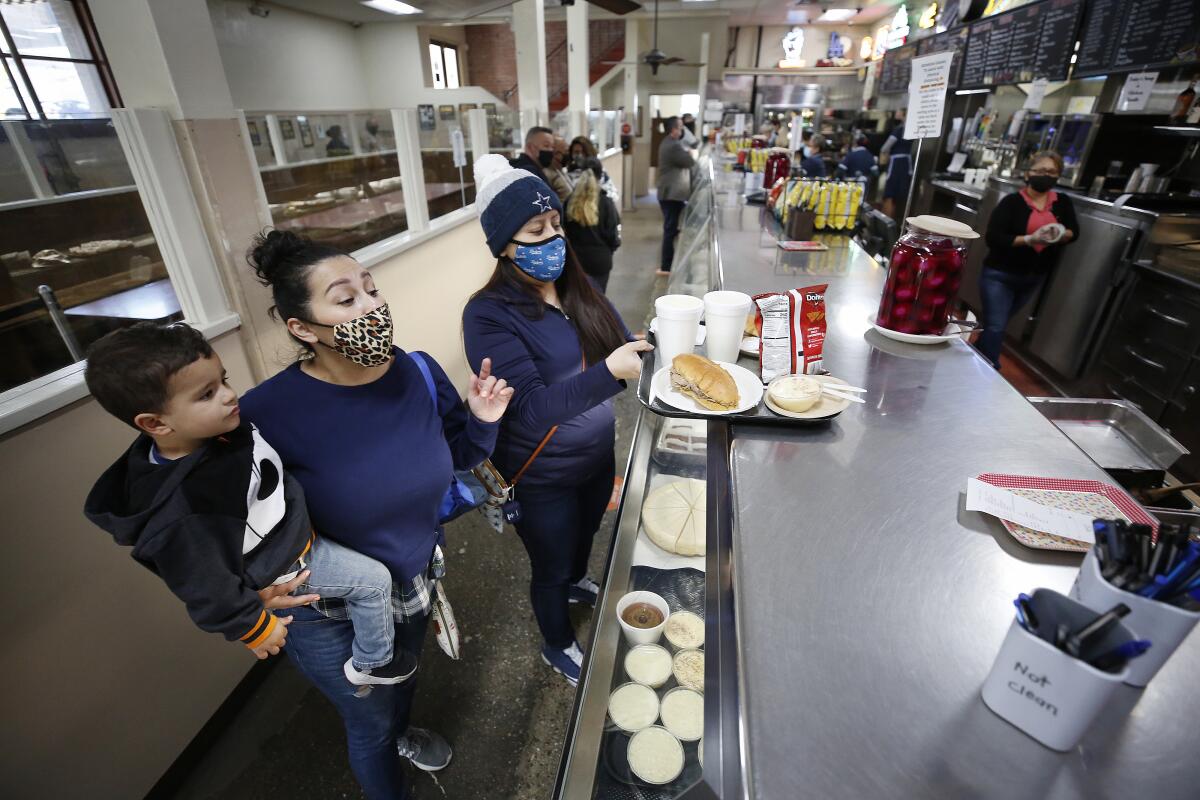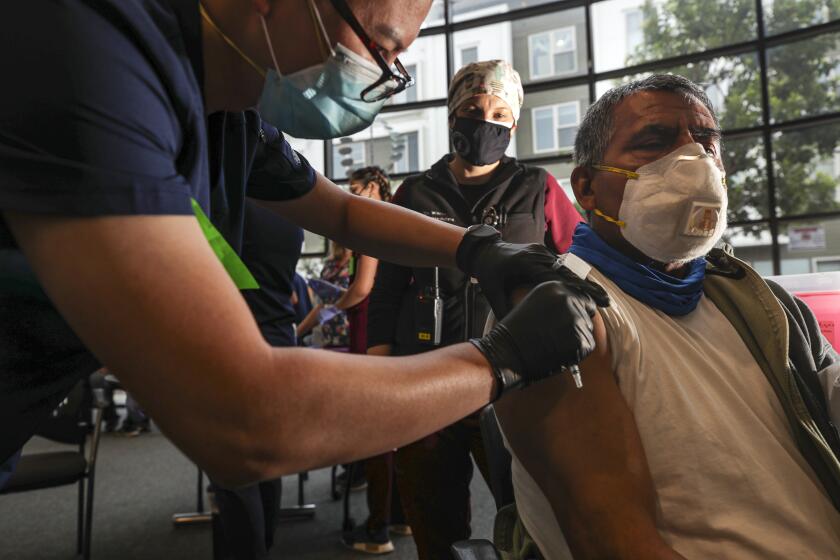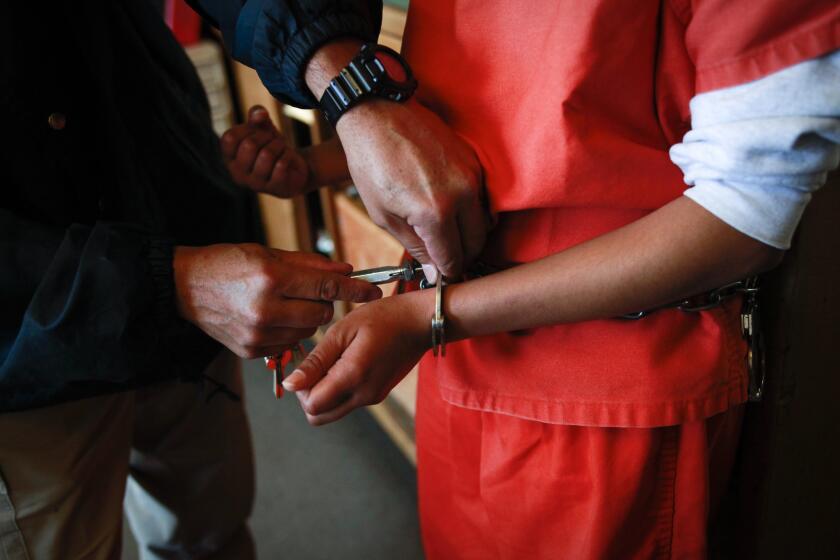As L.A. County reopens, officials plan for COVID-19 economic recovery

loosened COVID-19 restrictions.
- Share via
Los Angeles County saw a $735-million drop in sales tax revenue due to the pandemic-related economic slowdown, but the county will avoid layoffs and furloughs and funding to large departments, including the Sheriff’s Department, will remain largely unchanged, according to a budget proposal unveiled by officials on Monday.
County Chief Executive Fesia Davenport said in a presentation to reporters that despite the financial hit from the pandemic, her “leaner” budget proposal still includes millions to help finance services to address homelessness, child welfare, healthcare and mental health.
“The pandemic has exposed and increased the gap between the haves and have-nots in Los Angeles County,” Davenport said. “This budget seeks to address that.”
That includes directing almost $427 million to finance Measure H strategies, a jump of about $17 million, that’ll be directed at expanding and sustaining interim housing beds and motel vouchers, and increasing money spent on permanent supportive housing.
Davenport also recommends adding about $30 million to expand mental health crisis and intervention services, a response to the sharp increase in demands placed on the county’s mental health system — including a 30% increase in phone calls to the county Department of Mental Health’s helpline.
The budget also proposes the county spend $57 million to increase foster care resources, and an additional $35 million on “fair and efficient elections.” Almost $20 million is recommended to create jobs for young people and workers displaced by the pandemic. Two offices — the Alternatives to Incarceration initiative, and the county’s anti-racism initiative — would receive $3.6 million to finance 10 new positions in the CEO’s offices to lead those efforts.
Davenport said her budget recommendations include a small increase of 304 jobs, primarily in health, bringing the total number of county workers to 110,499.
The last budget, approved amid the COVID-19 crisis, included $369 million in cuts to departments funded with locally generated money and eliminated 2,586 positions. That money doesn’t appear to be returning, and sacrifices will be made.
County departments submitted more than $2 billion in requests that won’t be likely funded. Of this, only $530 million of the most critical requests will be considered later this year as the county knows more about tax revenues and other revenue streams.
Last year, the county received $1.2 billion in CARES Act one-time funding that it spent on testing, rent relief, food, small business assistance grants, laptops for children in need, and the overall emergency response. Officials anticipate receiving $1.9 billion in federal coronavirus aid this year, $950 million of which should arrive in May,
“So what’s our economic outlook? We are cautiously optimistic,” Davenport told reporters. “That optimism is tempered by very real concerns.”
The county is on a slow yet steady path to recovery. Recent reports by economists suggest that economic recovery will speed up later this year, according to the county chief executive office‘s analysis.
Thousands of residents are being vaccinated each day, but the county’s recovery hinges, in part, on whether the vaccine supply stays steady. Additionally, if L.A. County sees another surge, that could prompt another round of shutdowns.
Reaching that milestone “would dramatically change the trajectory of the pandemic,” Public Health Director Barbara Ferrer said
Over the last few years, county supervisors have pushed for a “care first, jails last” approach to the county’s criminal legal system, which has included proposing the closure of the county’s decrepit Men’s Central Jail and far more dollars to finance alternatives to jail and prison.
However, Davenport’s budget proposal does not include a proposal for creating the Department of Youth Development, an agency proposed by the county Board of Supervisors in November, which would transition children and teenagers in the county probation department’s custody to the new agency’s care. The supervisors had asked for an initial investment of $75 million for the new department in the next fiscal year.
Davenport said it would be premature to allocate the money and that more work is needed before the county is ready to launch those efforts.
After years of incremental reform, Los Angeles County is moving to dismantle the largest youth justice system in the country in favor of a “care-first” model to better serve young people in custody.
The budget proposal marks the first time the county will allocate money to Measure J, a ballot measure passed in November that requires 10% of locally generated, unrestricted county money be spent on a variety of social services. The county is prohibited from using the money on prisons, jails or law enforcement agencies.
How much the county must spend to fulfill Measure J remains to be determined.
Davenport is recommending the county allocate $100 million for a “down payment” to start implementing Measure J, financing direct community investments and alternatives to incarceration. The money did not come from the Sheriff’s Department budget, which remains relatively unchanged at about $3.4 billion, she said.
The county has until June 2024 to figure out how much it is legally obligated to allocate to meet the 10% threshold. If nothing changed between now and the 2023-24 fiscal year, the county estimates that the full annual set-aside for Measure J would be $300 million.
But local advocates have taken issue with those estimates and plan to press the county for more.
The JusticeLA Coalition, which advocates for reimaging the county’s criminal legal system, was busy Monday organizing residents to call into the Board of Supervisors meeting Tuesday to voice their discontent with Davenport’s recommendation, which the organization called “a measly $100 million.”
Organizers argued that the county wants to allocate only $300 million on Measure J over a three-year period when their analysis estimates the true amount to be set aside as $966 million.
“This offering is yet another attempt to preserve the status quo and silence the voices of LA County residents,” according to a script being prepared Monday by JusticeLA for callers to read. “We did not march for racial justice in the streets, phone bank and go to the ballot box to have the county throw pennies at our communities.”
The supervisors will discuss Davenport’s proposal Tuesday and vote on a final budget in June.
More to Read
Sign up for Essential California
The most important California stories and recommendations in your inbox every morning.
You may occasionally receive promotional content from the Los Angeles Times.













